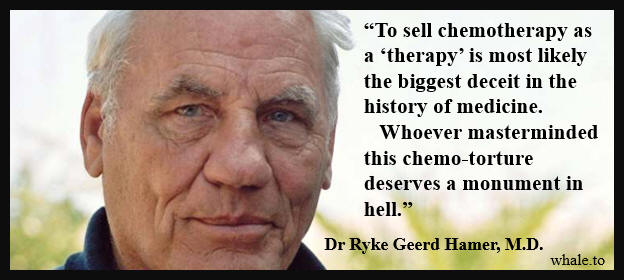Bristol-Myers Squibb
[back] Drug Industry
[The Corporation that produces most of the genocidal
poison known as Chemotherapy
(also notable for its suppression of
Laetrile at
Memorial Sloane Kettering).
Not content with killing hundreds of thousands of humans purely for profit they
then ignored the dozens of plants designed for the job (eg
1,
2, 3, 4,
5, 6,
most used for centuries by herbalists around the world) and went after the
sacred Yew (a tree that was worshiped by many cultures like the Celts; the Magna
Carta was signed under one---the Ankerwycke
Yew) by making a poisonous brew (like the traditional witch) out of its
bark, called Taxol. No doubt, they got
double points from Satan.]
Website: http://www.bms.com
See:
Memorial Sloane Kettering

Ryke Geerd Hamer, M.D.
Chemotherapy
[2009 Dec] BIG PHARMA’S CRIME SPREE
Pfizer, Eli Lilly & Co., Bristol-Myers Squibb Co. and four other drug companies
have paid a total of $7 billion in fines and penalties. Six of the companies
admitted in court that they marketed medicines for unapproved uses."
[April 2008] Drug
Executive Is Indicted on Secret Deal
The book is about how Bristol-Myers Squibb ripped off U.S. taxpayers and U.S.
cancer patients and their insurers. ....The
deal the NCI struck with Bristol-Myers raises two questions: Why Bristol-Myers?
Why did the NCI fail to extract from Bristol-Myers a promise to return some of
the profit from the sale of Taxol to the taxpayers who had financed three
decades of research on Taxol? Goodman and Walsh make a reasonable effort to
answer the first question; they make no effort to answer the second. They
discuss the possibility that Robert Wittes, an NCI employee from 1983 to 1988,
was the link between the NCI and Bristol-Myers who cemented the NCI agreement
with Bristol-Myers. Wittes became a vice president at Bristol-Myers in November
1988 just as the discussions about finding a partner for NCI were beginning. He
became an NCI employee again in August 1990. But, NCI denied any wrongdoing by
Wittes. The authors conclude, “[T]he reasons why Bristol-Myers Squibb emerged as
the successful contender remains hidden from public view.”
[Review by Kip Sullivan]
The Story of Taxol . Nature and Politics in the
Pursuit of an Anti-Cancer Drug By Jordan Goodman & Vivien Walsh
The Bristol-Myers/NCI CRADA gave the firm exclusive rights to NCI's
government-funded research, including the records of research completed before
Bristol-Myers entered the Taxol picture, as well as all "new studies and raw
data" from future NCI-funded Taxol research, which NCI agreed to make "available
exclusively to Bristol-Myers," so long as the company is "engaged in the
commercial development and marketing of Taxol." The company also received the
exclusive rights to harvest the Pacific Yew trees found on federal lands. In
return, the government receives no money or royalties, but only Bristol-Myers
Squibb's "best efforts" to commercialize Taxol, including a commitment to supply
Taxol for government-run clinical trials, which were needed to obtain FDA
marketing approval for the drug, and to an ambiguous "fair pricing" clause for
Taxol [2002] The
Other Drug War by James Love
If you look at the board of directors of
MSK you will find that the drug industry has a dominant position on that board. One
company in particular, Bristol Myers, which produces between 40 -50% of all the
chemotherapy in the world, and they have top positions at MSK hospital.
They are selling their own drugs to that particular hospital but they have written
into the by-laws of the centre that it does not constitute a conflict of interest to sell
their company drugs to the centre. They get around it by not taking a salary. They are not
paid, they are volunteers. Look what happens. You have a man like Benno Schmidt, who was
first head of the president's cancer panel under Nixon, then becomes head of MSK. He then
goes on using the knowledge he gained at MSK to set up his own drug company to make tens
of millions of dollars......The chairman of the board of Bristol Myers, the main company producing anti-cancer
drugs, who also happens to be on the board of MSK, is also on the board of the
New York Times. Everybody's brother in law is an oncologist, or on the board of
somebody else's something or other, so it is a money making thing for the
establishment. A hundred and seven billion, with a B, dollars a year business,
and we are not going to get rid of it easily. Interview of Dr Ralph Moss, Ph.D.
